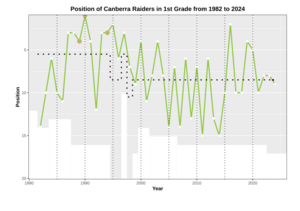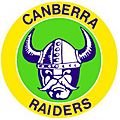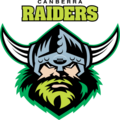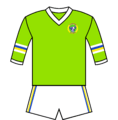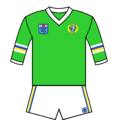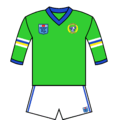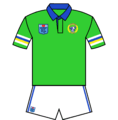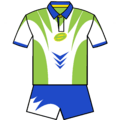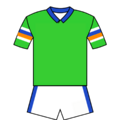Canberra Raiders facts for kids
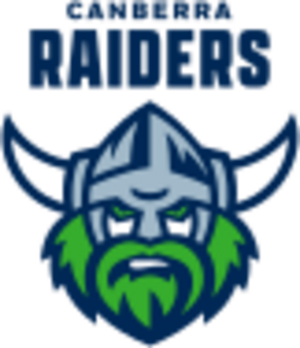 |
|||
| Club information | |||
|---|---|---|---|
| Full name | Canberra Raiders Rugby League Club |
||
| Nickname(s) | Raiders, The Green Machine, The Milk | ||
| Website | raiders.com.au | ||
| Colours | Lime Green White Blue |
||
| Founded | 30 March 1981 in Queanbeyan | ||
| Current details | |||
| Ground(s) |
|
||
| CEO | Don Furner Jr | ||
| Chairman | Dennis Richardson | ||
| Coach | Ricky Stuart | ||
| Captain | Joseph Tapine | ||
| Competition | National Rugby League | ||
| 2025 season | 1st | ||
|
|||
| Records | |||
| Premierships | 3 (1989, 1990, 1994) | ||
| Runners-up | 3 (1987, 1991, 2019) | ||
| Minor premiership | 1 (1990) | ||
| Wooden spoons | 1 (1982) | ||
| Most capped | 320 - Josh Papali'i | ||
| Highest points scorer | 2374 - Jarrod Croker | ||
The Canberra Raiders are a professional rugby league team from Canberra, Australian Capital Territory. They play in Australia's top rugby league competition, the National Rugby League (NRL) premiership. The club joined the league in 1982.
The Raiders have won three premierships and played in six Grand Finals. Their last Grand Final was in 2019, where they lost 14-8 to the Sydney Roosters. The team's home ground is Canberra Stadium in Bruce. Before 1990, they played at Seiffert Oval in Queanbeyan, New South Wales. The official symbol and mascot for the Canberra Raiders is a Viking named Victor.
The Raiders were one of the first teams from outside Sydney to join the New South Wales Rugby League premiership. They joined with the Illawarra Steelers in 1982. Over the years, they got better and better. They were the first non-Sydney team to reach the finals in 1987. They also played in a Grand Final that year and won their first premiership in 1989. This started a very successful time for the club, with five Grand Final appearances and three wins in eight years. During this period, famous international players like Mal Meninga, Laurie Daley, and Ricky Stuart played for the Raiders.
After this golden age, the club faced some challenges, including the Super League war. They joined the new NRL competition. In the 2000s, many experienced players left the team. By 2009, the Raiders had only a few players who had played at a high representative level.
Contents
Team History and Successes
Early Years and First Finals
The New South Wales Rugby Football League (NSWRFL) wanted to expand its competition beyond Sydney in the early 1980s. The Queanbeyan Blues rugby league team, coached by Colin O'Rourke, was chosen to form the Canberra team. The Canberra franchise became the 14th team for the 1982 season. They were the first NSWRFL club outside Sydney since the old Newcastle team left in 1909.
The team's first season was tough, and they finished last. They were known for losing games late, earning nicknames like "Canberra Faders." In 1982, no other team gave up more tries in a season than the Raiders. Their first win was a close 12-11 game against Newtown Jets in their eighth match. In 1983, they won nine games, more than double their first year. However, they still struggled to win away from home.
In 1984, they improved a lot, winning more games than they lost. They even played a special game for fifth place but lost. So, they still hadn't reached the semi-finals. 1985 and 1986 were not as good, but the team was building a strong group of players like Mal Meninga, Gary Belcher, and Steve Walters. These players would become very important in the next decade.
Golden Era: Grand Final Wins
This was the most successful time for the Raiders, with five Grand Finals and three premierships. In 1987, the team finished third and made their first semi-finals. They lost their first finals match but fought back to reach the Grand Final. They lost to Manly Sea Eagles 18-8 in the last Grand Final played at the Sydney Cricket Ground. Many future stars like Laurie Daley and Glenn Lazarus joined the team in 1987.
In 1988, the team scored lots of points and won many games by large margins, finishing third again. However, they lost in the semi-finals. Future international players Bradley Clyde and Ricky Stuart made their debuts in 1988.
In 1989, with only five games left, Canberra was in danger of missing the finals. But they started a nine-game winning streak, which led to their first Premiership. They made it into the finals in fourth place and had to win every game to keep going. They beat Cronulla Sharks and Penrith Panthers to reach the Preliminary Final. There, they defeated the top team, South Sydney Rabbitohs, to get to their second Grand Final in three seasons.
The 1989 Grand Final against the Balmain Tigers was one of the greatest ever. Canberra tied the game late with a try and conversion, sending it into extra time. A reserve player, Steve Jackson, scored the winning try, breaking through four defenders to win the premiership for the Raiders. After this win, the Raiders played in England in the 1989 World Club Challenge but lost to Widnes.
Fullback Gary Belcher was the first Raider to be the league's top point scorer in 1988. In 1989, he also became the first Raider, and the first fullback ever, to be the league's top try scorer.
Continued Success and Challenges
1990 was a fantastic year for the club. All three of their teams (first grade, reserves, and juniors) reached the Grand Final, with only the reserves losing. The first-grade team won their first Minor Premiership (finishing first in the regular season) and their second straight title, beating Penrith in the final.
In 1991, the club faced problems with player salaries. Despite this, they reached their fourth Grand Final, their third in a row. However, they lost to Penrith this time. Some key players left the club because of the salary issues, and in 1992, the Raiders missed the finals for the first time since 1986.
After their last premiership in 1994, a big win against Canterbury-Bankstown Bulldogs, the Raiders found it hard to attract top players. They struggled to reach their previous heights. They were knocked out early in the 1996 finals. In 1997, they joined the Super League competition, losing in the preliminary final. When the NRL was formed the next year, the team began to decline. Club legends Ricky Stuart and Bradley Clyde even had to leave. Ricky Stuart later returned to coach the team from 2014.
New Millennium and Rebuilding
In the 2000s, the Raiders had mixed results. They often finished just inside or outside the top eight and were usually knocked out of the finals early. In 2003, they surprised everyone by leading the competition for most of the season. They lost a close finals game but still advanced. In another very close game, they lost by one point in the preliminary final and were eliminated.
Many fans hoped for even better results in the following years. However, the Raiders finished eighth in 2004 and were knocked out in the first week of finals. Key players like Ruben Wiki and Mark McLinden left the club. In 2005, many thought the team would finish last, but they surprised everyone again, even being joint leaders early in the season. Injuries later affected them, and they finished near the bottom.
In 2006, more long-serving players left the club. Despite predictions they would finish last, the team fought back and made the finals. They lost their first finals match and were eliminated. This was also the last game for coach Matthew Elliott.
In 2007, with many new, young players and a new coach, Neil Henry, the Raiders were a mystery. Many thought they would get the "wooden spoon" (finish last). They finished 14th, but two players, Phil Graham and Neville Costigan, played for representative teams. The team played much better at home than away.
The 2008 season started well, but the club then had a series of losses. Despite many injuries, the Raiders made it to the finals by winning seven of their last nine regular season games. However, they were eliminated in the first week. The season had some issues, with star players facing disciplinary actions.
The 2009 season started slowly. With help from young players like Josh Dugan and Jarrod Croker, they won their next two games. Despite a disappointing season, the Raiders managed to beat the Melbourne Storm for the first time in 14 games and seven years. They also had a memorable win against the top team, St George-Illawarra Dragons. However, losses to teams at the bottom of the ladder meant they finished 13th.
2010s: Ups and Downs
The 2010 season started poorly, but the Raiders surprised many by winning some early games. They had a four-game losing streak in the middle of the season. Then, they went on a great run, winning eight of their last nine regular season matches to sneak into the top eight. A record home crowd of 20,445 watched them beat the Dragons.
In the finals, the Raiders beat the Penrith Panthers in a close game, their first finals win in a decade. This led to a home final against the Wests Tigers. A record crowd of 26,746 hoped for another win, but the Raiders lost by two points, ending their season.
In 2011, the Raiders added new players but faced a big challenge when their star player, Terry Campese, was injured. After a strong start, they lost eight games in a row and were at the bottom of the ladder. They then had a big upset win against the Melbourne Storm, their first win in Melbourne since 2000.
In 2012, Canberra finished sixth and made the finals. They beat the Cronulla-Sutherland Sharks but were eliminated by South Sydney Rabbitohs the next week.
The 2013 season began with two tough losses. The team also faced disciplinary issues with some players. However, they then won five of their next seven games, including upsets against top teams. They won all their home games for the first 12 rounds.
In 2014, Ricky Stuart became the new head coach. A star player, Anthony Milford, decided to leave for another team, which disappointed fans. The Raiders finished 15th, just avoiding last place. In 2015, they finished 10th.
2016 was a great year for Canberra. They finished second, their best result in a long time. They made the finals for the first time since 2012. Jarrod Croker broke the club's point-scoring record, and the team scored the most points ever in a single season. They reached the preliminary final but lost a very close game to the Melbourne Storm.
In 2017 and 2018, Canberra finished 10th and missed the finals. In 2018, they often lost games despite having big leads.
The 2019 season started very well, with five wins from their first six games. They were in third place after 21 rounds. New players like Charnze Nicoll-Klokstad and John Bateman were outstanding. After beating South Sydney in the preliminary final, Canberra reached their first Grand Final in 25 years, playing against the Sydney Roosters.
In the 2019 NRL Grand Final, Canberra lost to the Sydney Roosters 14-8 in a controversial game. A referee's decision about a new set of tackles caused confusion, and the Roosters scored soon after, winning the premiership.
Recent Seasons: 2020s
In 2020, Canberra finished fifth. They won two finals games before losing to Melbourne in the preliminary final, ending their season.
The 2021 season started with high hopes, but after winning their first two games, Canberra won only once in the next seven. They were in 13th place after 16 rounds. They then had a late-season comeback, winning five of their last eight games, but still missed the finals, finishing 10th.
Canberra had a poor start to the 2022 season, losing five games in a row. By round 14, they were 11th. However, they went on a great run, winning eight of their last ten games to finish eighth. In the first week of finals, Canberra upset Melbourne 28-20. The next week, they lost to Parramatta Eels, ending their season.
In 2023, Canberra finished eighth and made the finals. They were eliminated in week one, losing to Newcastle in extra time. This extended their premiership drought to 30 seasons.
In the 2024 NRL season, Canberra finished ninth, missing the finals due to a worse points difference, even though they had the same number of points as the eighth-placed team. They finished the season strongly with three wins, including upsets over Penrith and the Sydney Roosters.
Toyota Cup (Under 20s)
The Raiders' Under 20s team won the Toyota Cup Premiership in 2008, beating the Broncos in extra time. In 2009, they finished eighth but upset the top team in the first week of finals before losing in week two.
Season Summaries
| Competition | Games Played |
Games Won |
Games Drawn |
Games Lost |
Ladder Position |
P | R | M | F | W | Coach | Captain | Crowd Average |
Details |
|---|---|---|---|---|---|---|---|---|---|---|---|---|---|---|
|
|
26 | 4 | 0 | 22 | 14th |
|
Round 18 Billy Sullivan |
|
|
|
||||
|
|
26 | 9 | 0 | 17 | 10th | Don Furner |
|
|
|
|||||
|
|
24(1) | 13(0) | 0(0) | 11(1) | 6th |
|
Ron Giteau |
|
|
|||||
|
|
22 | 8 | 2 | 14 | 10th |
|
|
|||||||
|
|
24 | 8 | 1 | 15 | 11th |
Round 18 Allan McMahon |
Dean Lance |
|
|
|||||
|
|
24(4) | 15(2) | 0(0) | 9(2) | 3rd |
|
|
|
|
|
||||
|
|
22(2) | 15(0) | 0(0) | 9(2) | 3rd |
|
Tim Sheens |
|
|
|||||
|
|
22(4) | 14(4) | 0(0) | 8(0) | 4th |
|
|
Mal Meninga |
|
|
||||
|
|
22(3) | 16(2) | 1(0) | 5(1) | 1st |
|
|
|
|
|
||||
|
|
22(4) | 14(3) | 0(0) | 6(1) | 4th |
|
|
Round 11 Graham Rogers & Tim Sheens |
|
|
||||
|
|
22 | 10 | 0 | 12 | 12th | Tim Sheens |
|
|
||||||
|
|
22(2) | 16(0) | 1(0) | 5(2) | 3rd |
|
|
|
||||||
|
|
22(4) | 17(3) | 0(0) | 5(1) | 3rd |
|
|
|
|
|||||
|
|
22(2) | 20(1) | 0(0) | 2(1) | 2nd |
|
Ricky Stuart |
|
|
|||||
|
|
21(1) | 13(0) | 1(0) | 7(1) | 6th |
|
|
|
||||||
|
|
18(3) | 11(1) | 0(0) | 7(2) | 3rd |
|
Mal Meninga |
|
|
|||||
|
|
24(2) | 15(1) | 0(0) | 9(1) | 7th |
|
Laurie Daley |
|
|
|||||
|
|
24 | 12 | 1 | 10 | 9th |
|
|
|||||||
|
|
26(2) | 15(1) | 0(0) | 11(1) | 4th |
|
|
|
||||||
|
|
26 | 9 | 1 | 16 | 11th | Simon Woolford |
|
|
||||||
|
|
24(1) | 10(0) | 1(0) | 13(1) | 8th |
|
|
|
|
|||||
|
|
24(2) | 16(0) | 0(0) | 8(2) | 4th |
|
|
|
||||||
|
|
24(1) | 11(0) | 0(0) | 13(1) | 8th |
|
|
|
||||||
|
|
24 | 9 | 0 | 15 | 14th |
|
|
|||||||
|
|
24(1) | 13(0) | 0(0) | 11(1) | 7th |
|
|
|
|
|||||
|
|
24 | 9 | 0 | 15 | 14th | Neil Henry | Alan Tongue |
|
|
|||||
|
|
24(1) | 13(0) | 0(0) | 11(1) | 6th |
|
|
|
||||||
|
|
24 | 9 | 0 | 15 | 13th | David Furner |
|
|
||||||
|
|
24(2) | 13(1) | 0(0) | 11(1) | 7th |
|
|
|
||||||
|
|
24 | 6 | 0 | 18 | 15th |
|
|
|||||||
|
|
24(2) | 13(1) | 0(0) | 11(1) | 6th |
|
|
|
|
|||||
|
|
24 | 10 | 0 | 14 | 13th |
Rounds 22-24 Andrew Dunemann |
|
|
|
|||||
|
|
24 | 8 | 0 | 16 | 15th | Ricky Stuart | Jarrod Croker |
|
|
|||||
|
|
24 | 10 | 0 | 14 | 10th |
|
|
|||||||
|
|
24(3) | 17(1) | 1(0) | 6(2) | 2nd |
|
|
|
||||||
|
|
24 | 11 | 0 | 13 | 10th |
|
|
|||||||
|
|
24 | 10 | 0 | 14 | 10th |
|
|
|||||||
|
|
24 | 15 | 0 | 9 | 4th |
|
|
Jarrod Croker, Josh Hodgson, Elliot Whitehead |
|
|
||||
|
|
20 | 14 | 0 | 6 | 5th |
|
|
|
||||||
|
|
24 | 10 | 0 | 14 | 10th |
|
|
|||||||
|
|
24 | 14(1) | 0 | 10(1) | 8th |
|
Round 22 Andrew McFadden & Brett White |
Jarrod Croker, Joseph Tapine, Elliot Whitehead, Jack Wighton |
|
|
||||
|
|
24 | 13 | 0 | 11 | 8th |
|
|
|
|
|
Team Match Records
Head-to-Head Records
| Opponent | Played | Won | Drawn | Lost | Win % |
|---|---|---|---|---|---|
| 3 | 2 | 0 | 1 | 66.67 | |
| 39 | 25 | 1 | 13 | 64.10 | |
| 61 | 37 | 0 | 24 | 60.66 | |
| 31 | 18 | 0 | 13 | 58.06 | |
| 44 | 24 | 0 | 20 | 54.55 | |
| 53 | 28 | 0 | 25 | 52.83 | |
| 65 | 34 | 0 | 31 | 52.31 | |
| 59 | 30 | 2 | 27 | 50.85 | |
| 50 | 25 | 0 | 25 | 50.00 | |
| 83 | 41 | 0 | 42 | 49.40 | |
| 75 | 37 | 0 | 38 | 49.33 | |
| 82 | 38 | 1 | 43 | 46.34 | |
| 72 | 33 | 0 | 39 | 45.83 | |
| 58 | 24 | 1 | 33 | 41.38 | |
| 65 | 24 | 1 | 40 | 36.92 | |
| 54 | 16 | 0 | 38 | 29.63 |
Finals Appearances
The Canberra Raiders have made the finals 24 times: 1987, 1988, 1989, 1990, 1991, 1993, 1994, 1995, 1996, 1997, 1998, 2000, 2002, 2003, 2004, 2006, 2008, 2010, 2012, 2016, 2019, 2020, 2022, 2023.
Team Look and Colors
- Canberra Raiders Logos
Since the beginning, the Raiders' team colors have been lime green and white, with blue and gold stripes. Recently, their "away" jersey is mostly white with lime green, blue, and gold stripes. Lime green was chosen as the main color to make the team stand out. Blue and gold were included because they are the traditional sports colors of the Australian Capital Territory.
The original jersey design was chosen through a competition in 1981. The winning design was by Ms. Patricia Taylor. The lime green color came from David Lane's entry, who had suggested the team name 'Canberra Cockatoos'.
- Home jerseys of the Raiders
Shirt Sponsors and Manufacturers
| Year | Kit Manufacturer | Major Sponsor | Back Top Sponsor | Sleeve Sponsor | Back Bottom Sponsor | Front Shorts Sponsor | Back Shorts Sponsor | Chest Sponsor |
|---|---|---|---|---|---|---|---|---|
| 1982 | Classic Sportswear | - | - | - | - | - | - | - |
| 1983-84 | Woodger’s | Woodger’s | ||||||
| 1985-89 | Peerless | |||||||
| 1990 | Video Ezy | Video Ezy | Video Ezy | Video Ezy | ||||
| 1991 | Canterbury of New Zealand | |||||||
| 1992 | Bega Cheese | |||||||
| 1993-94 | Canberra Milk | Canberra Milk | Video Ezy | Canberra Milk | ||||
| 1995 | Peerless | |||||||
| 1996 | News Classifieds | News Classifieds | Ansett Australia | News Classifieds | ||||
| 1997 | Nike | Ansett Australia | - | - | ||||
| 1998 | Oracle | Oracle | Oracle | |||||
| 1999 | Classic Sportswear | Oracle | ||||||
| 2000-02 | Puma | OzEmail | OzEmail | Compuware | OzEmail | |||
| 2003 | ISC | Fone Zone | Fone ZoneFone Zone | Reward Insurance | Reward Insurance | |||
| 2004 | Canberra Milk | Canberra Milk | ||||||
| 2005-06 | Aristocrat Leisure | |||||||
| 2007-09 | CFMEU | The Tradies | Local Liquor | Local Liquor | ||||
| 2010 | Canberra Milk/ACT TAB | |||||||
| 2011 | The Tradies | |||||||
| 2012 | Huawei | Huawei | ||||||
| 2013 | Defence Housing Australia | Defence Housing Australia | Local Liquor | Local Liquor/ACT TAB | Abode Hotels | |||
| 2014-15 | Local Liquor | |||||||
| 2016 | McDonald’s | Denman Prospect | Denman Prospect/Austbrokers Canberra | TTM Security | ||||
| 2017-18 | Huawei | Dare Iced Coffee | McDonald’s | ITP | ||||
| 2019-20 | Austbrokers Canberra | Denman Prospect/McDonald’s | ||||||
| 2021 | Canberra Milk | Toyota Forklifts | Canberra Airport/McDonald’s | |||||
| 2022 | Toyota Forklifts | Toyota Forklifts | Canberra Milk | Palmerbet | ||||
| 2023 | - | Canberra Milk | ||||||
| 2024 | CDC Data Centres | |||||||
| 2025- | Club Lime | AEI Insurance | Denman Prospect/McDonald’s | Canberra Airport |
Home Stadiums
Seiffert Oval: Early Home Ground
From 1982 to 1989, the Raiders played their home games at Seiffert Oval in Queanbeyan, New South Wales. Their first game there was on March 6, 1982, against the Western Suburbs Magpies. The Magpies won 33-4. The Raiders' first win at Seiffert was on April 18, a 21-11 victory over Newtown Jets.
The Raiders played 98 games at Seiffert Oval, winning 52 and losing 45, with one draw. The largest crowd at Seiffert was 18,272 in 1989, when the Raiders beat the Brisbane Broncos.
Bruce/Canberra Stadium: Current Home
In 1990, the Canberra Raiders moved to Bruce Stadium, next to the Australian Institute of Sport. The club has played there ever since. The stadium was later renamed Canberra Stadium and then GIO Stadium. By the end of the 2022 NRL season, the Raiders had played over 300 games at Canberra Stadium.
The record attendance for a Raiders game at Canberra Stadium is 26,567. This was for a finals match against the South Sydney Rabbitohs in 2019. The Raiders won 16-10 and went on to their first Grand Final since 1994. The club shares the stadium with the Super Rugby team, the ACT Brumbies.
Canberra Raiders Leagues Club
The Queanbeyan Leagues Club (QLC) started in 1963. In 1972, the QLC burned down but was rebuilt a year later. The famous "Blue Room" was added, offering fancy dining and music. The QLC's auditorium also hosted popular acts.
When the Canberra Raiders were formed in 1982 and started having success, the QLC grew a lot. In 1989, the auditorium was updated, and a nightclub was built.
The club is part of the Raiders Group, which runs several clubs in the ACT and Queanbeyan:
- Raiders Belconnen
- Raiders Gungahlin
- Raiders Mawson Club
- Raiders Weston
Current Team Squad
Famous Players
25-Year Dream Team
In 2006, to celebrate the club's 25th season, the Canberra Times newspaper picked a "Dream Team" of 25 players.
| First team squad | Coaching staff | ||||||||
|---|---|---|---|---|---|---|---|---|---|
|
|
Head coach
|
|||||||
Representative Players
Team Coaches
The first coach for the Canberra Raiders was Don Furner, who had played for Queensland and Australia. He was coaching in Queanbeyan when the club started in 1982. In 1987, Wayne Bennett joined him, and that year the Raiders reached their first Grand Final. In 2022, Ricky Stuart became the longest-serving coach for the club.
Team Statistics and Records
The Raiders' biggest win was by 68 points, when they beat the Parramatta Eels 68-0 in 1993. Their worst loss was 4-68 against the Melbourne Storm in 2013. Canberra has won eleven games in a row twice, in 1990 and 1995.
Jason Croker has played the most games for the Raiders, with 318 matches between 1991 and 2006. He is also second in all-time tries scored for the club with 120. In 2025, Josh Papali'i passed Croker to become the most capped player. Jarrod Croker is Canberra's highest ever point scorer with 2374 points (136 tries, 915 goals) from 2009 to 2023. Jarrod Croker was the top point scorer in the NRL in 2012, 2015, and 2016. He was also named Dally M captain of the year in 2016.
Club Achievements
Premierships (3)
|
Runners Up (3)
|
||||||||||||||||||||||||||||||||
Minor Premierships (1)
|
Youth and Pre-Season Titles
- NSWRL Premier League: 1
-
- 2003
- New South Wales Rugby League Club Championships: 1
-
- 1990
- Channel TEN Challenge Cup: 1
-
- 1990
- Tooheys Challenge Cup: 1
-
- 1993
- Jersey Flegg Cup: 2
-
- 1989, 1993
- Under-20s Competition: 1
-
- 2008
- Presidents Cup: 2
-
- 1990, 1995
- S.G. Ball Cup: 3
-
- 1995, 2005, 2021
- Harold Matthews Cup: 4
-
- 1978, 1984, 1993, 1995
Team Supporters
Canberra Raiders fans are very supportive. They have websites, podcasts, and forums like "Raidercast" and "The Greenhouse."
Raiders fans are well-known for their Viking War Horn and the 'Viking Thunder Clap'. This clap is similar to the one made famous by fans of the Iceland national football team.
Some famous people who support the club include:
|
|
Women's Team
See also
 In Spanish: Canberra Raiders para niños
In Spanish: Canberra Raiders para niños
 | Isaac Myers |
 | D. Hamilton Jackson |
 | A. Philip Randolph |


